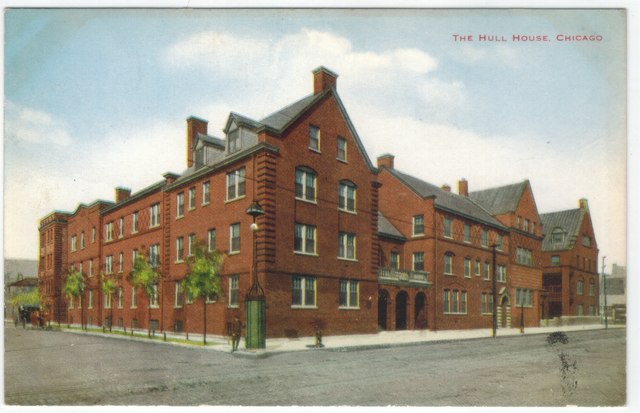Democracy, Pragmaticism and Ethics: Lessons From Hull House
Published on May, 14 2024
May 2024
Why WILPF? Why now? The questions continue: What do we have to offer? What makes us unique? Hull-House pragmaticism can be a model, a go-to prescription, a handwriting on the wall, of our values, of life and death choices, for a freedom that is inclusive and member-driven; compassion served with hot sauce – the spice from our legacy of women and men standing up, with new ideas – with earth-shaking insights left for us to churn like butter and make a difference that would be spread around the world. Learn about our legacy of passion and possibilities from the women of Hull House experimenting with a new way of thinking.
On Wednesday, May 15, come and meet some of the women and men who created and enacted a 20th century social reform movement, and in turn, helped to create 21st century sociology. Mary Hanson Harrison, WILPF US past-president, will present the ‘Oasis of Hope: American Pragmaticism, Hull House and Putting Theory into Action’.
Please register in advance for this 5 pm PT/6 pm MT/7 pm CT/8 pm ET meeting, using this link. After registering you’ll receive the Zoom link and other information on how to join the meeting.
Here is an introduction that Mary wrote for her presentation on May 15.
‘Democracy and Social Ethics’* – Imagine That!
How can we get people tuned in rather than turned off during the incessant duplicity and repetitive doomsday prophecies over social media? Or even more importantly, how are we “to [keep our] moral energy [going] to create a new sort of force into the world,” as Jane Addams asked of us?

Hull House, Chicago; Credit: V.O. Hammon Publishing Co. (Public domain)
Embedded in the founding of Hull House is the groundbreaking mapping of practical information of the immigrant population, such as cultural differences and patterns that would better illustrate the issues and interests of the various communities. Mapping also supported the reciprocal interchanges between immigrants and Hull House women by instilling a collective decision-making process. In other words, to act in the best interests of the community on their own terms and to value the community’s social ethos. Learning from the experience of others and transforming the concept of democracy was the bedrock of the new pragmatic ideas of Addams and the Hull-House women, often in conjunction with W.E.B. Dubois, John Dewey and William James, as well as other prominent movers and shakers.
The zeitgeist of the late 19th century and early 20th century was radical in that it systematically challenged the status quo. Along with the Social Gospel movements, both black and white, pragmatism as a philosophy was revolutionary and dealt with many of the same conflicts we are dealing with today. As a fresh and even startling oasis for philosophical thought put into action, Hull House stands as a reservoir for the practice of community building, peacemaking and non-violent resistance. It is no longer just a museum but a vigorous partner for WILPF’s present and future practice of a “newer democracy”.

Please register in advance for this 5 pm PT/6 pm MT/7 pm CT/8 pm ET meeting.
*In 1898, Jane Addams gave a lecture at Grinnell College in Grinnell, Iowa entitled “Democracy and Social Ethics.” She was looking for a “newer conception of democracy.” Our “standard of social ethics is not attained by travelling a sequestered byway, but by mixing on the thronged and common road where all must turn out for one another, and at least see the size of one another’s burdens.”



